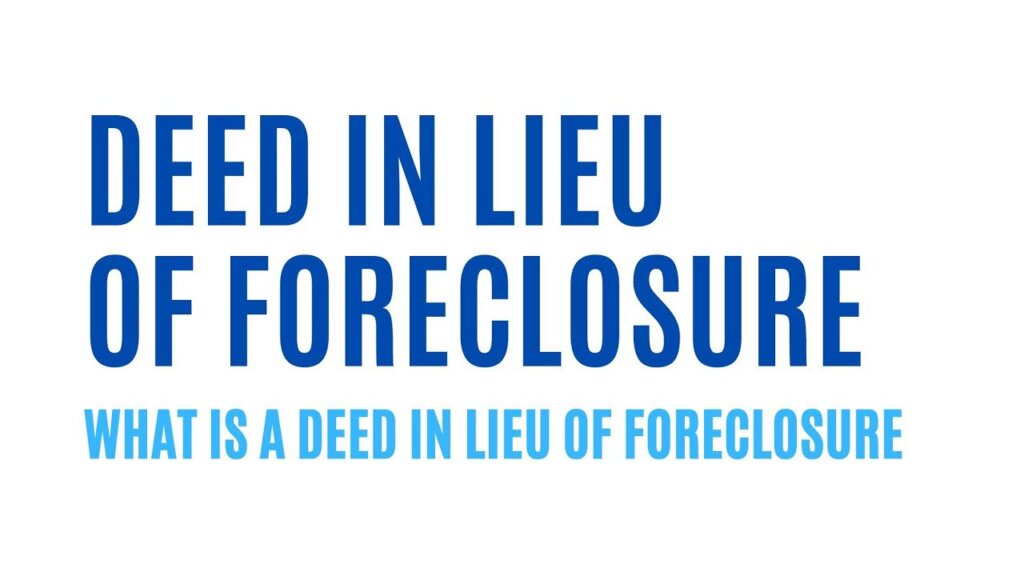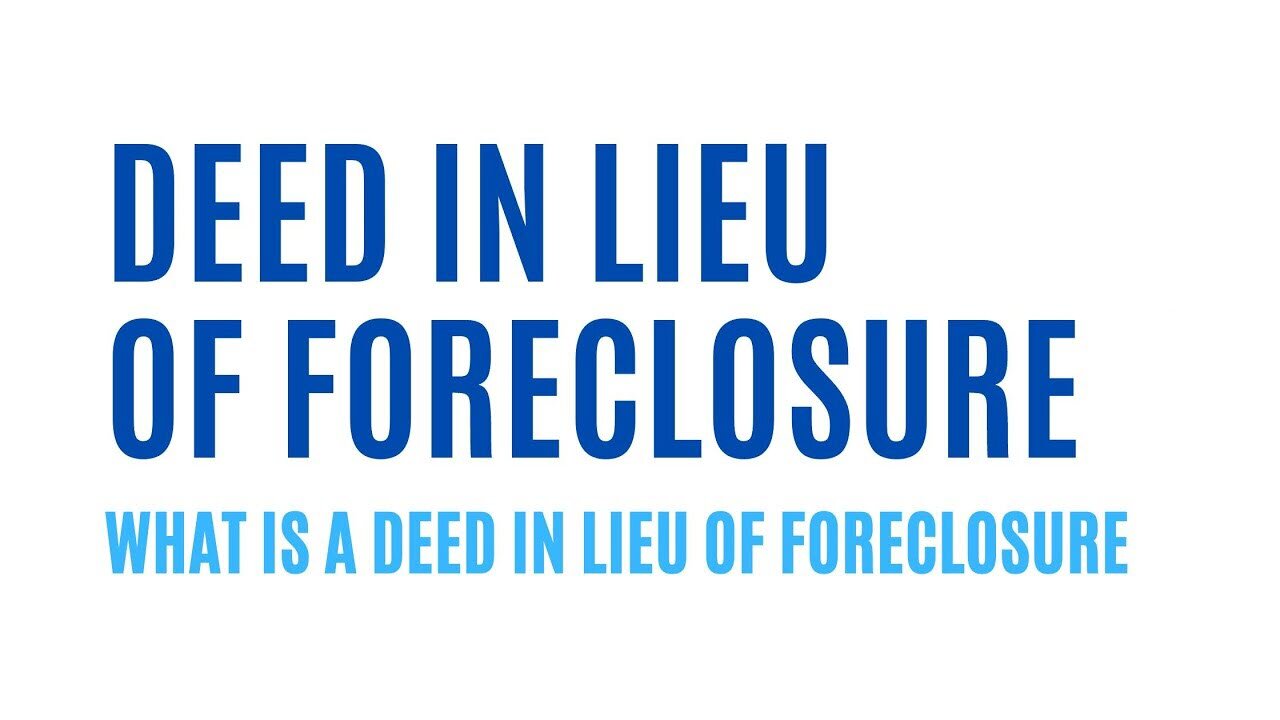
Facing foreclosure can be an overwhelming and stressful experience. The looming threat of losing your home triggers immense pressure and anxiety, leaving homeowners scrambling for solutions. Amidst these challenging circumstances, exploring alternative pathways to avoid the adverse consequences of foreclosure becomes crucial. One such option is “Deed in Lieu of Foreclosure,” a unique solution that may offer respite for those facing insurmountable mortgage debts.
Understanding Deed in Lieu of Foreclosure:
Deed in Lieu of Foreclosure is a legal agreement between a homeowner facing foreclosure and their mortgage lender. In this agreement, the homeowner voluntarily deeds their property back to the lender in exchange for releasing them from their mortgage obligation. Essentially, instead of going through a lengthy and stressful foreclosure process, the homeowner surrenders their home to the lender, allowing them to sell it to recoup the outstanding debt.
Advantages of Deed in Lieu of Foreclosure:
For Homeowners:
Avoids Foreclosure: A deed in lieu of foreclosure eliminates the complexities and emotional turmoil associated with foreclosure.
Reduces Stress: Bypassing lengthy legal proceedings and potential eviction anxieties, a deed in lieu of foreclosure offers a quicker resolution.
Limits Credit Damage: Though credit scores still take a hit, the damage is often less severe compared to a full-fledged foreclosure.
Saves Time and Money: Eliminates costs associated with repairs, legal fees, and court proceedings.
Provides Easier Transition: Allows for a swifter relocation and avoids prolonged dwelling on a lost dwelling.
For Lenders:
Expedited Repossession: Enables faster and less expensive property repossession compared to a formal foreclosure process.
Reduced Legal Costs: Avoids legal fees incurred during lengthy foreclosure proceedings.
Minimizes Delays: Eliminates uncertainties and delays associated with foreclosure auctions and potential legal challenges.
Maintains Property Value: Early intervention helps maintain the property’s value, reducing potential losses from a distressed sale.
Disadvantages of Deed in Lieu of Foreclosure:
For Homeowners:
Loss of Equity: Homeowners relinquish any equity accrued in the property.
Potential Tax Implications: Forgiveness of debt may trigger tax liabilities for the homeowner.
Credit Score Impact: Though less severe than foreclosure, credit scores still suffer a negative impact.
Limited Bargaining Power: Negotiation leverage for outstanding debt settlement is minimal.
Last Resort Option: A deed in lieu of foreclosure should be considered only after exhausting other options, as it signifies surrender of ownership.
For Lenders:
Potential Legal Liabilities: Lenders may face accusations of coercion or unfair terms if not handled transparently.
Unforeseen Repair Costs: Unexpected repairs or hidden damages could decrease the property’s resale value.
Potential Delays in Resale: Resale may be delayed due to market conditions or unforeseen property issues.
Is Deed in Lieu of Foreclosure Right for You?
Considering a deed in lieu of foreclosure can be a valid option for homeowners facing hardship. However, it’s crucial to thoroughly evaluate its advantages and drawbacks. Consulting a qualified mortgage professional and legal advisor is highly recommended to understand the legal implications and explore alternative payment options.
Key Considerations:
Financial Situation: Assess your ability to meet your existing mortgage obligations and explore alternative solutions.
Equity Value: Understanding the amount of equity you have built up in your property is crucial.
Tax Implications: Seek professional advice on potential tax consequences related to debt forgiveness.
Impact on Your Credit: Be aware of the credit score impact and how it affects future housing options.
Negotiating Debt Forgiveness: Explore the possibility of negotiating a partial debt forgiveness with your lender.
Seeking Legal Guidance: Consult with a lawyer specializing in foreclosure and real estate law to ensure your rights are protected.
Here are some ways to avoid foreclosure aside from a deed in lieu of foreclosure:
1. Reinstate your mortgage:
If you have missed a mortgage payment, you may be able to reinstate your loan by making up all the missed payments, including principal and interest, plus fees and expenses. This will prevent foreclosure from proceeding.
2. Enter into a repayment plan:
If you have fallen behind on your mortgage payments but can afford to make regular payments, you may be able to enter into a repayment plan with your lender. This will allow you to catch up on your missed payments over time and avoid foreclosure.
3. Enter into a forbearance agreement:
A forbearance agreement is a temporary agreement with your lender that allows you to postpone your mortgage payments for a period of time. This can give you some breathing room to get your finances back on track.
4. Refinance your mortgage:
If you have equity in your home, you may be able to refinance your mortgage to a lower interest rate. This will reduce your monthly payments and make your mortgage more affordable.
5. File for bankruptcy:
Bankruptcy can protect you from your creditors, including your mortgage lender. If you truly meet the requirements for bankruptcy, this can give you some time to work out a plan to repay your debts.
6. Sell your house for cash:
If you are facing foreclosure, you may be able to sell your home and use the proceeds to pay off your mortgage. This will prevent foreclosure and allow you to walk away from your debt. Reach out to us today if you are considering selling your house in Virginia for cash. We will provide you a fair all cash offer on your property in 24 hours.
7. Work with a foreclosure avoidance counselor:
A foreclosure avoidance counselor can help you understand your options and develop a plan to avoid foreclosure. They can also provide you with resources and support.
8. Apply for government assistance:
There are a number of government programs that can help you avoid foreclosure, such as the Home Affordable Modification Program (HAMP) and the Making Home Affordable Program (MHA).
9. Negotiate with your lender:
If you are facing foreclosure, you may be able to negotiate with your lender for a more favorable outcome. This could include a reduction in your principal balance, a lower interest rate, or a longer repayment plan.
10. Consider a short sale:
A short sale is a sale of your home for less than the amount you owe on your mortgage. Your lender may agree to a short sale if they believe it is in their best interests to avoid a foreclosure.
Remember, the sooner you take action to address your mortgage delinquency, the more options you will have for avoiding foreclosure.
Conclusion:
Deed in Lieu of Foreclosure can be a viable means for homeowners facing insurmountable mortgage debt to avoid the full force of foreclosure. However, it’s essential to weigh the advantages and disadvantages carefully, explore alternative solutions, and seek professional guidance before opting for this path. Remember, facing financial hardship can be overwhelming, but seeking help and exploring options can help secure a brighter future.

